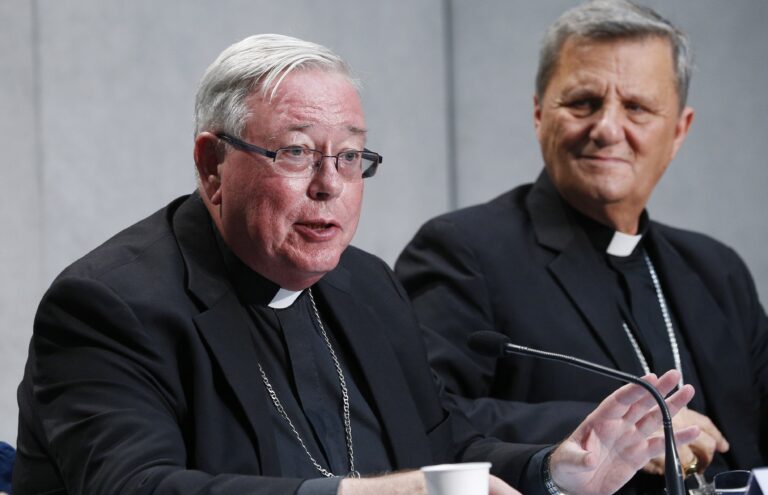A letter to all the bishops around the world from Cardinals Mario Grech and Jean-Claude Hollerich (Jan 26, 2022) just prior to the 7 Continental Assemblies caused a bit of a stir. Grech is the Secretary General of the Synod and Hollerich is the General Relator, so obviously their thinking is significant.
They reminded the bishops that the sole theme of the upcoming Synod (in October 2023, meeting again in October 2024) is: “For a Synodal Church: communion, participation, mission”. They went on to say that ‘it is not the task of the Assembly to address all the issues being debated in the Church…other themes cannot be surreptitiously introduced’.
And then, in reference to the Working Document for the Continental Stage (DCS), which collated all the national syntheses, they wrote that ‘…the themes that the DCS proposed do not constitute the agenda of the next Assembly’. Was all this an attempt to pre-empt the 7 Continental Assemblies and then the Universal Synod itself by eliminating discernment of contested issues in advance?
Borne
That this is not so is borne out by the proceedings of the recent European Continental Assembly in Prague (Feb 5-12), not least by the contribution of the Irish delegates.
In what Brendan Hoban called a ‘compelling statement’ that ‘kept faith with the Irish Report’, the delegates (Dr Nicola Brady, Archbishop Eamon Martin, Julieann Moran and Fr Eamonn Fitzgibbon – the latter two delivered the presentation to the assembled gathering) noted the fruits of the Irish consultation, including the ‘open wound’ of clerical and institutional abuse; the many submissions calling for women to be admitted to the diaconate and priesthood; the hurt experienced by people identifying as LGBTQI+ and those in second unions; the calls too for greater inclusion of migrants and refugees; of people living with disabilities; of young people; of single parents; of care for the earth– noting too that ‘some of those who love the pre-Vatican II liturgy also spoke of their sense of exclusion’.
In summary, the Irish delegation noted a ‘deep longing for a more inclusive and welcoming Church’, observing that to achieve this will require ‘…the courage and wisdom of the Spirit to review and inspire any necessary doctrinal, structural, canonical, and pastoral changes, without destroying communion or losing sight of the person and teaching of Jesus Christ’.
Of course it is clear that not all at the European Assembly agreed with this Irish approach: this is what a synodal approach is about, the creation of a safe space to air differences openly and to seek the generative presence of the Holy Spirit.
However it is also clear that the Assembly chose not to interpret the Grech/Hollerich letter in a restrictive sense: in fact, also in that letter, they made it clear that all that has been heard in the consultation phases is legitimate content for inclusion in the Universal Synod and that, while everything cannot be covered in one event, it is the job of these preparatory meetings to prioritise issues such that an agenda emerges that is faithful to the ‘holy people of God’ who ‘share also in Christ’s prophetic office’ (Lumen Gentium, n 12), such that one needs to listen to the ‘entire body of the faithful, who anointed as they are by the Holy One (I Jn 2.20, 27) cannot err in matters of belief’ (LG, 12).
And so, when the two Cardinals repeat the great question, often divisive, that has been challenging the Church since the Second Vatican Council: ‘Church, what do you say of yourself’, they have no hesitation in affirming that the answer is a Church that is ‘constitutively synodal’.
In other words, a Church that listens to all the faithful and gives them a share in the priestly, prophetic and kingly (governing) roles of Jesus Christ.
Context
It makes sense, in this context which is also one of decentralisation while remaining part of something universal, for the Irish Synodal pathway to take careful cognisance of the fruits of the universal assembly, but not to allow this more global process to hinder the work that needs to be done here at home.
To this end, since the more public events of last year, this year at home has been quieter but no less purposeful: apart from feedback to Rome on the DCS document, people are being trained at diocesan and parish level to lead local communities in discernment and to reach out to those on the peripheries, while the Steering Committee itself is giving thought to a strategy and style of assembly (or assemblies) to propose to the Irish bishops for the Irish Synodal Pathway over the next few years.
By definition, in a journey into the unknown, there will be cul-de-sacs, U-turns, wrong paths chosen, as well as those moments of illumination and joy that the two disciples experienced on the road to Emmaus.
Gerry O’Hanlon SJ, member of
the Synodal Steering Committee,
writing here in a personal capacity.



